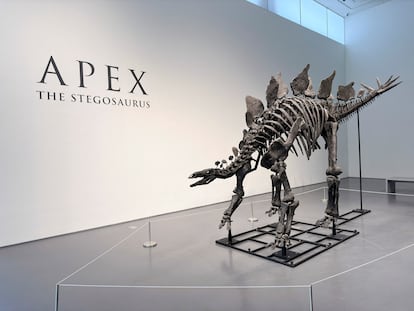$44.6 million for a dinosaur: The other kinds of Wall Street investments
Kenneth C. Griffin, founder of hedge fund Citadel, paid a record amount for a stegosaurus skeleton. Like him, other wealthy financiers are building up valuable collections of art and historical artifacts

The founder of the hedge fund Citadel is the second richest investor in the world and, as of a few hours ago, the owner of Apex, “the largest and most complete stegosaurus ever found.” Kenneth C. Griffin paid $44.6 million for the skeleton, which is 11 feet tall and nearly 27 feet long from nose to tail, at an auction held on Wednesday at Sotheby’s. The final price tag shattered pre-sale estimates of between $4 million and $6 million. It is the highest amount ever paid for a dinosaur skeleton, and exceeds the $32 million paid four years ago by Abu Dhabi for Stan, a Tyrannosaurus Rex.
Discovered only two years ago on private land in an area of Colorado, Moffat County, well known for its Upper Jurassic deposits, Apex stood out from the beginning because it is one of the few skeletons found intact, according to the auction house. It is made up of 254 fossil bone elements of an approximate total of 319. Its future will now probably be inside a U.S. museum, since Griffin has emphasized that “Apex was born in America and is going to stay in America.”
This is not the first Jurassic adventure by Griffin, who in 2018 donated $16.5 million to a Chicago museum to finance the exhibition of a cast of the largest dinosaur ever discovered, but it does represent one of the first known incursions of the great wolves of Wall Street into this market, which until now had received more attention from Hollywood figures such as Leonardo DiCaprio or Nicolas Cage. To date, Griffin’s track record as a collector had been limited to the art world, where he is known both for his strong bidding at auctions and in the private market. In 2020 he shelled out $100 million for a Basquiat, down from the $500 million he had paid five years earlier in a transaction in which he managed to get his hands on two works, Jackson Pollock’s Number 17A and Willem de Kooning’s Interchange. It was small change for an investor whose fortune amounts to $37 billion, of which he has used more than $1 billion to build a house for his mother in the most luxurious area of Palm Beach, Florida, even though doing so meant previously having to buy and demolish a total of 13 different properties.
The origin of his love for collecting goes back, according to his own admission, to a trip to New York in 1999 when, by chance, he entered Sotheby’s auction house and saw a sculpture of one of Degas’ famous ballet dancers. He tried to acquire it, but was unsuccessful. “I was outbid, I was outbid—I tried to buy it, the hammer went down, it wasn’t my bid, I wasn’t willing to go that high,” he acknowledged in statements collected by Vanity Fair magazine. “I had never been so frustrated in my life. I hung up the phone, and I called Sotheby’s the next day and offered more money to buy it, and that was the start of my passion in art,” he added.
Griffin’s fondness for collecting is shared by a good handful of major fund managers, who also enjoy significant tax benefits. This is the case of J. Tomlinson Hill, former president and CEO of Blackstone Alternative Asset Management, and currently one of the world’s largest art collectors. On the walls of his collection there are works by Rubens, Warhol, Picasso, Bacon and Caravaggio. “I don’t collect. Rather, I look for works of art that challenge me and that can then converse with the other pieces I have,” he told EL PAÍS a little more than two years ago. The origin of his collection is a Campbell’s soup can painted by Warhol for which he paid around $340,000.
Steve Cohen has a wealth of hobbies. The founder of the hedge fund Point72 is also the owner of the New York Mets baseball team and owns, among other works, Picasso’s The Dream, a painting for which he paid $155 million in 2013 to casino magnate Steve Wynn. But his collection, which rotates quarterly through the various offices of the fund in the US, UK and Asia, is much larger and is valued at more than $1 billion. It represents a small part of a fortune estimated at more than $13 billion.
But it’s not all lavish foundations and Manhattan apartments decorated with works worth millions of dollars. In 2021, one of the pioneers of the hedge fund world, Michael Steinhardt, was forced to return almost 200 works of art valued at more than $70 million. A federal investigation revealed that the works were stolen from sites in a total of 11 countries, including Egypt, Greece, Israel, Syria and Turkey. As determined at the time, the investor, whose fortune exceeds $1.2 billion, demonstrated for decades “a voracious appetite for looted artifacts without concern for the legality of his actions, the legitimacy of the pieces he bought and sold or the serious cultural damage he caused around the world.” Steinhardt avoided jail time, but in exchange he had to accept a lifetime ban on collecting works of art.
Sign up for our weekly newsletter to get more English-language news coverage from EL PAÍS USA Edition
Tu suscripción se está usando en otro dispositivo
¿Quieres añadir otro usuario a tu suscripción?
Si continúas leyendo en este dispositivo, no se podrá leer en el otro.
FlechaTu suscripción se está usando en otro dispositivo y solo puedes acceder a EL PAÍS desde un dispositivo a la vez.
Si quieres compartir tu cuenta, cambia tu suscripción a la modalidad Premium, así podrás añadir otro usuario. Cada uno accederá con su propia cuenta de email, lo que os permitirá personalizar vuestra experiencia en EL PAÍS.
¿Tienes una suscripción de empresa? Accede aquí para contratar más cuentas.
En el caso de no saber quién está usando tu cuenta, te recomendamos cambiar tu contraseña aquí.
Si decides continuar compartiendo tu cuenta, este mensaje se mostrará en tu dispositivo y en el de la otra persona que está usando tu cuenta de forma indefinida, afectando a tu experiencia de lectura. Puedes consultar aquí los términos y condiciones de la suscripción digital.









































